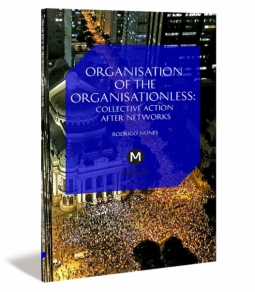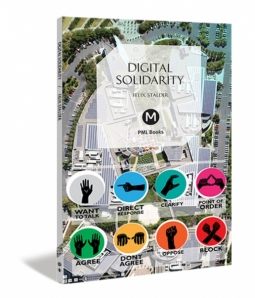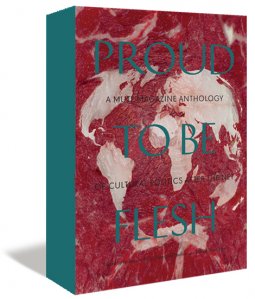Shop Artice (4 smaller articels)
Organisation of the Organisationless: Collective Action After Networks
By Rodrigo Nunes
Series editors: Clemens Apprich, Josephine Berry Slater, Anthony Iles & Oliver Lerone Schultz.
Rejecting the dichotomy of centralism and horizontalism that has deeply marked millennial politics, Rodrigo Nunes’ close analysis of network systems demonstrates how organising within contemporary social and political movements exists somewhere between – or beyond – the two. Rather than the party or chaos, the one or the multitude, he discovers a ‘bestiary’ of hybrid organisational forms and practices that render such disjunctives false. The resulting picture shows how social and technical networks can and do facilitate strategic action and fluid distributions of power at the same time. It is by developing the strategic potentials that are already immanent to networks, he argues, that contemporary solutions to the question of organisation can be developed.
Buy on Amazon UK £4.25 and other regions, Super Saving free shipping.
Part of the PML Books series. A collaboration between Mute and the Post-Media Lab
Rodrigo Nunes is a lecturer in modern and contemporary philosophy at the Catholic University of Rio de Janeiro (PUC-Rio), Brazil. He coordinates the research group Materialismos (http://materialismos.tk), which investigates the resurgence of metaphysical speculation in contemporary philosophy and its interfaces with other fields such as politics, science and anthropology. He has been involved in several political initiatives over the years, such as the first editions of the World Social Forum and the Justice for Cleaners campaign in London. He is a member of the editorial collective of Turbulence (http://turbulence.org.uk).
Rodrigo Nunes is a co-editor of What Would it Mean to Win?, Turbulence Collective (Eds.), PM Press, 2010
Reviews of What Would it Mean to Win?
‘Powerful vision of the possible and the seldom-seen present.’
—Rebecca Solnit, author, Hope in the Dark and A Paradise Built in Hell
‘This kind of innovative thinking, which emerges from the context of the movements, opens new paths for rebellion and the creation of real social alternatives.’
—Michael Hardt, co-author, Commonwealth, Multitude and Empire
(2014. ISBN 978-1-906496-75-3; eBook ISBN 978-1-906496-82-1)
Digital Solidarity
By Felix Stalder
Series editors: Clemens Apprich, Josephine Berry Slater, Anthony Iles & Oliver Lerone Schultz
Published in association with Post-Media Lab Books
Buy on Amazon UK £4.25 and other regions, Super Saving free shipping.
(Winter, 2013. ISBN 978-1-906496-92-0; eBook ISBN 978-1-906496-93-7)
Felix Stalder’s extended essay, Digital Solidarity, responds to the wave of new forms of networked organisation emerging from and colliding with the global economic crisis of 2008. Across the globe, voluntary association, participatory decision-making and the sharing of resources, all widely adopted online, are being translated into new forms of social space. This movement operates in the breach between accelerating technical innovation, on the one hand, and the crises of institutions which organise, or increasingly restrain society on the other. Through an inventory of social forms – commons, assemblies, swarms and weak networks – the essay outlines how far we have already left McLuhan’s ‘Gutenberg Galaxy’ behind. In his cautiously optimistic account, Stalder reminds us that the struggles over where we will arrive are only just beginning.
Today, we are entering into a new constellation,
a new galaxy and the reformulation of solidarity in a
myriad of ways [...] There are new institutional
and cultural forms emerging to support such complex
webs of interaction and production, often based on the
notion of a shared resource, a commons, and focused on
the particular requirements necessary to develop and
protect that one resource. They offer a chance to remake
society in a particular way, through reinventing social
solidarity and democracy, be it in the digital networks
of informational cooperation or in the common
appropriation of physical spaces.
– Felix Stalder, Digital Solidarity
Other books by Felix Stalder
Vergessene Zukunft (Forgotten Future), Radikale Netzkulturen in Europa
By Clemens Apprich & Felix Stalder
“The refreshing perspective of this anthology reveals an
alternative interpretation of Internet culture beyond the
well-known, mythologising narrative of techno-libertarianism..”
– Martin Schmitt, sehepunkte, 13/5 (2013)
Cultures and Ethics of Sharing / Kulturen und Ethiken des Teilens
Edited by Wolfgang Sützl, Felix Stalder, Ronald Maier, Theo Hug
“This is a volume of essays about sharing. Few people could have predicted that practices of sharing would gain such prominence in contemporary society. It is, arguably, one of the most unexpected developments of the early 21st century. ”
– From the Introduction
Manuel Castells: The Theory of the Network Society
By Felix Stalder
“This book is a very beautiful model of how one mind engages with another: Felix Stalder has seized the essence of Manuel Castells′s work and its immense relevance to our time. Daring to be positively critical, Stalder enlarges and also defines Castells′s arguments. Thus the book multiplies Castells by Stalder and the result is an instant expansion of the mind of the reader.”
– Derrick DeKerckhove, University of Toronto
Edited by Simon Worthington, Damian Jaques, Pauline van Mourik Broekman and Adrian Shaughnessy
A new history from 8 Books charts the journey that this seminal title has made under the direction of co-founders Simon Worthington and Pauline van Mourik Broekman. It also features much of designer Damian Jaques' 'raw HTML-like aesthetic', as Adrian Shaughnessy has it in his introduction, in evidence during his tenure at Mute. - Creative Review, August 2008
'This is a visually and journalistically astringent take on the birth of the internet, and a reminder of the rich visual innovation of independent magazines.' - eye magazine, Summer 2008, John O'Reilly
Date of Publication: 25 April 2008
ISBN: 9780955432224
As the Creative City model for urban regeneration founders on the rocks of the recession, and the New Labour public art commissioning frenzy it triggered recedes, Anthony Iles and Josephine Berry Slater take stock of an era of highly instrumentalised public art making.
Focusing on artists and consultants who have engaged critically with the exclusionary politics of urban regeneration, their analysis locates such practice within a schematic history of urban development’s neoliberal mode. Breaking down into a report and a collection of interviews, this investigation consistently focuses on the forms and, indeed, possibility of critical public art within a regime that fetishes ‘creativity’ whilst systematically destroying its preconditions in its pursuit of capital accumulation. How, they ask, is critical art shaped by its interaction with this aspect of biopolitical governance?
ISBN 978-1906496425
Date of Publication: 9/9/2010
126 pages
Buy on Amazon UK £35 and other regions, Super Saving free shipping
In late 1994, back in the days of dial-up modems and Netscape Navigator 1.0, Mute magazine announced its timely arrival. Dedicated to an analysis of culture and politics 'after the net', Mute has consistently challenged the grandiose claims of the communications revolution, debunking its utopian rhetoric and offering more critical perspectives.
Fifteen years on, Mute Publishing and Autonomedia are delighted to announce the publication of Proud to be Flesh: A Mute Magazine Anthology of Cultural Politics after the Net. The anthology selects representative articles from the magazine's hugely diverse content to reprise some of its recurring themes. This expansive collection charts the perilous journey from Web 1.0 to 2.0, contesting the democratisation this transition implied and laying bare our incorporeal expectations; it exposes the ways in which the logic of technology intersects with that of art and music and, in turn and inevitably, with the logic of business; it heralds the rise of neoliberalism and condemns the human cost; it amplifies the murmurs of dissent and revels in the first signs of collapse. The result situates key – but often little understood – concepts associated with the digital (e.g. the knowledge commons, immaterial labour and open source) in their proper context, producing an impressive overview of contemporary, networked culture in its broadest sense.
Proud to be Flesh features a bold mix of essays, interviews, satirical fiction, email polemics and reportage from an array of international contributors working in art, philosophy, technology, politics, cultural theory, radical geography and more. Accessible introductions, a chronological arrangement of chapters and three full-colour image sections grant special insight into the evolution of key themes over time.
In its refusal of specialisation, Proud to be Flesh is unique in its field. It offers a compelling view onto the messy but exciting moment that was the turn of the millennium as well as being an incomparable sourcebook for those seeking to push forward analysis of the global crisis that has since ensued.
ISBN Hardback: 978-1-906496-27-2
ISBN Softback: 978-1-906496-28-9
Date of Publication: 4/11/2009
624 pages
Mute Books Orders
For Mute Books distribution contact Anagram Books
contact@anagrambooks.com
For online purchases visit anagrambooks.com










